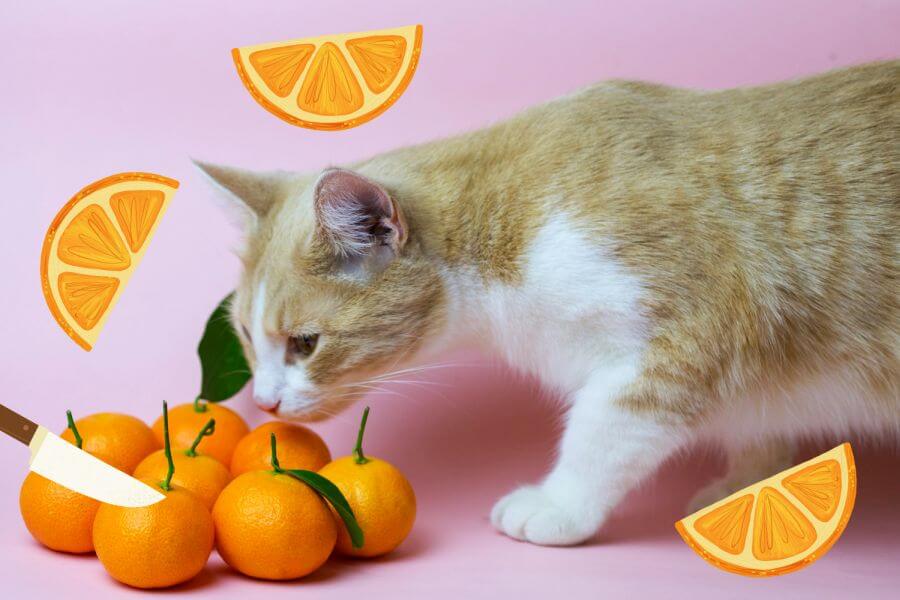Cats and Oranges
- Hold up, cat-lovers! While your feline friend might be eyeing that juicy orange of yours, not everything is as sweet as it seems! 🍊
- Sure, cats can lick an orange (but like, once a year), but hold off on passing them any more. 🍊
- Why, you ask? Well, the orange peel and our kitties just don’t mix. Packed with essential oils and psoralen, orange peels can be toxic for cats. 🍊
- A nibble or two probably won’t end in a cat-astrophe, but a hearty bite could lead to some unhappy tummies. 🍊
Can Cats Eat Oranges?
Can cats eat oranges? Nope, and you shouldn’t even attempt that. Now, we know what you’re thinking: “My cat loves to try new things!” While that’s all well and good, remember that oranges come with a sugar punch that can spell trouble for our fur-babies. Too many can lead to weight issues or even diabetes in cats. Yikes! Plus, let’s not forget that citrus fruits can lead to upset kitty tummies. That said, we are aware that kitties are, for sure, curious creatures. So if they want to sniff, or even lick a little, that won’t kill them. But that’s it!

Editor’s Note 😸
Remember, our adorable furballs are obligate carnivores, not orange-munching machines! While they can enjoy a variety of fruits and veggies, it’s best to stick with low-sugar options. How about watermelon or strawberries next time?
“My Cat Ate an Orange” Scenarios
When your furry buddy decides to go all-in on an orange, don’t panic! Keep calm and observe. If they’ve munched on a small piece or two, they should be okay. Just ensure no orange peel was involved – that’s a no-go area! If they’ve dived into a whole orange, watch out for signs of discomfort, like vomiting or diarrhea. Got a ‘cat-astrophe’ on your hands? Ring up your vet right away! Remember, oranges can be a threat, and they’re not cat-essential. 🍊🐱💕
Essential Oils: Friend or Foe? 🍊
So, what about essential oils? Shouldn’t they be safe for cats? Hate to burst your bubble, but orange essential oil is a no-no for cats. Topical use or adding it to their water can lead to vomiting or dermatitis. Plus, cats hate the scent of citrus. So, save your orange essential oil for diffusing on a sunny day instead!

Orange Juice: A Cat Cocktail? 🍹
Can cats sip on some OJ? Orange juice may be packed with vitamin C, but cats don’t really need it. Plus, the citric acid could harm your kitty if they drink too much. And let’s not kid ourselves, the chances they’ll want to drink some are basically at 1%.
Oranges and Cats: A Sour Affair? 😾
Finally, can cats eat oranges? No, they can’t. End of story. Any form of orange is a potential threat for your kitty. All they can have is a sniff. You shouldn’t leave any slices or peels where your kitty can easily access them. Ms. Whiskers may not eat them, but there’s a big chance she’ll play with it and bite it.
FAQs: Feline Fine with Fruits 😺
Are Oranges Harmful to Cats?
While not typically harmful, too many oranges can cause digestive upset in cats, especially if they’re allergic or sensitive. Always consult your vet before trying any new foods.
What Fruits Are Toxic to Cats?
Apart from citrus fruits, keep your kitty away from grapes, raisins, and avocados – these fruits are toxic to our feline friends.
How Toxic Is Citrus to Cats?
A little citrus won’t usually cause problems. Oranges, minus the peel, are generally safe. Lemons and limes, on the other hand, might upset your kitty’s stomach due to their acidity.
So, fellow cat lovers, now you have the juicy details about how cats can eat oranges! Remember, treat your kitty well, and they’ll purr their way into your heart – no oranges required! 🍊🐱💕
Similar Posts:
- Can Dogs Eat Oranges? Best Citrus Fruit Tips for You and Your Dog
- Can Cats Eat Mango? The Kitty’s Digest in a Nutshell
- Can Dogs Eat Lemons? Are Citrus Fruit Bad for Dogs?
- Can Cats Eat Strawberries? Why Do Cats Like Strawberries?
- Can Dogs Eat Grapefruit? The Benefits and Risks
- Can Cats Eat Watermelon? How Beneficial Is It?
- What Fruits Can Cats Eat? These Human Foods Are Safe for Cats
- Can Cats Eat Fruit? What to Remember About Human Food

